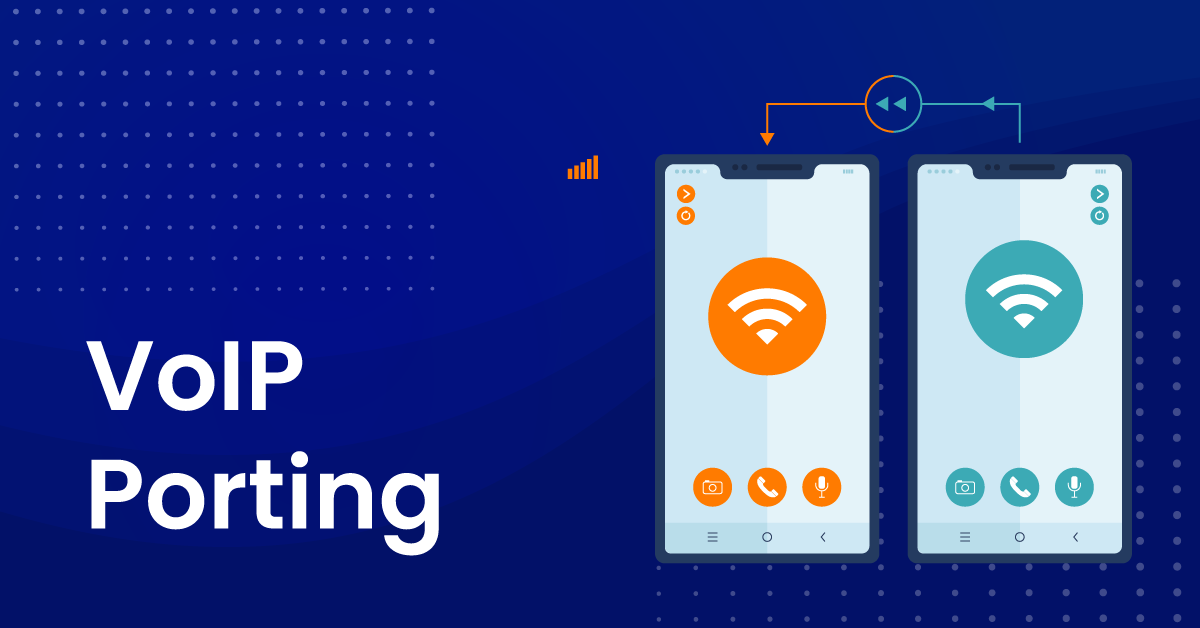Do you know the meaning of VoIP QoS and its potential impact on your customer communication plan? Get familiar with the technical components of VoIP quality through our informative breakdown.
VoIP, also known as Voice over Internet Protocol, has transformed communication by allowing voice calls to be transmitted over the internet. However, VoIP call quality can be greatly influenced by factors like latency, jitter, and packet loss. This is when VoIP Quality of Service becomes crucial. QoS encompasses various technologies and practices created to efficiently handle network resources and guarantee optimal performance of internet voice communications.
QoS improves call quality by giving priority to VoIP traffic and controlling bandwidth allocation, resulting in a level of quality that can rival or exceed traditional telephone systems. This technology is imperative for businesses and individuals who depend on clear, continuous communication.
Understanding VoIP and Its Significance
This Voice over Internet Protocol (VoIP) technology enables voice calls to be transmitted over the internet instead of using conventional telephone connections. This form of communication utilizes the internet’s broad accessibility to provide effective and adaptable telecommunication options.
The main purpose of VoIP, or how VoIP works, is to convert analog voice signals into digital data packets. These packets are sent through the internet and then transformed into voice signals once they reach the receiver’s end. This digital transmission technique can greatly reduce expenses for companies and customers, as it sidesteps the charges usually linked with conventional phone services.
The importance of Voice over IP goes beyond just saving money. It presents a level of flexibility and scalability that cannot be matched by traditional phone systems. Users are able to receive calls from any location with internet access, rather than being restricted to certain phones or dedicated lines. This characteristic is especially beneficial for companies that operate internationally or have employees working remotely.
What is Quality of Service in VoIP?
The importance of Quality of Service (QoS) in VoIP lies in its ability to organize and prioritize network traffic in order to guarantee clear and uninterrupted voice communications over the internet. In VoIP, having good QoS is crucial due to voice data being very sensitive to delays, jitter, and packet loss, which can greatly affect call quality.
Here’s how QoS enhances VoIP communications:
Prioritization
QoS mechanisms have the ability to give priority to Voice over IP packets over network traffic like file downloads or email, which are not as time-sensitive. This guarantees that voice packets are given priority in processing and transmission, thereby decreasing latency and reducing delays in communication.
Bandwidth Management
QoS tools are able to reserve a dedicated section of the available bandwidth solely for VoIP communication. This ensures that voice calls will still have sufficient bandwidth for sound quality even in busy network conditions with other data traffic.
Traffic Shaping
This involves controlling the movement of network traffic and evenly distributing spikes of data that may clog or slow down voice packets. Traffic shaping ensures a steady stream of voice data, leading to a decrease in jitter.
Avoiding Packet Loss
QoS configurations decrease the Voice over IP packet loss by managing the handling of the packets to prevent them from being discarded. Methods like duplicating packets or implementing forward error correction can be used to guarantee that all voice data reaches its intended location.
What are the Quality of Service Limitations and When They Apply?
The significance of Quality of Service (QoS) in network systems is crucial, but it is important to acknowledge its constraints when creating and deploying network infrastructure for applications like VoIP. Listed are some primary limitations of Quality of Service (QoS) and the specific scenarios in which they typically apply.
Dependence on All Network Devices
In order for QoS to work efficiently, all devices on the network path (such as routers and switches) must be capable of and set up for QoS. If a section of the route does not uphold QoS, prioritizing and controlling traffic could be negatively impacted.
Complexity in Configuration and Management
Configuring QoS can be challenging, necessitating in-depth understanding of the network’s structure and the unique QoS features of network equipment. Incorrect configuration may result in decreased performance rather than enhancements.
Limited Impact on External Networks
QoS settings are usually only useful in a network that is under your control. Once data exits your network and travels through the internet or another outside network, QoS configurations are no longer in effect, and the traffic is governed by the policies and congestion of the external network.
Cannot Eliminate Jitter and Latency Completely
Even though QoS can reduce jitter and latency, it cannot fully eradicate these problems. Network conditions, such as severe congestion and long physical distances, continue to have significant impacts.
Resource Allocation Challenges
Effectively managing the requirements of various types of traffic can pose a challenge. Assigning an excessive amount of bandwidth to a single service could result in neglecting another, which could be just as important in a different situation.
VoIP QoS Implementation Strategies
Implementing internet phone service quality requires a multifaceted approach that considers the network’s hardware and software aspects. Here are key strategies for effective call quality assurance implementation.
Traffic Prioritization
Prioritize cloud phone traffic over non-real-time data to ensure that voice packets receive preferential treatment. It prevents delays and disruptions, especially during periods of network congestion.
Router Configuration
Configure routers to prioritize Internet Calling traffic and implement traffic-shaping mechanisms to regulate data flow. Quality of Service markings and differentiated services code point (DSCP) settings are necessary in router configuration for call quality assurance.
Network Capacity Planning
Sufficient bandwidth allocation is necessary for call quality assurance. Perform network capacity planning to determine the required bandwidth for cloud based phone calling traffic and ensure that the network can handle the volume of voice data without degradation in quality.
Jitter Buffer Settings
Adjust jitter buffer settings based on network conditions. Fine-tuning the jitter buffer size helps balance minimizing delay and compensating for jitter variations.
Redundancy and Error Correction
Integrate redundancy and error correction mechanisms to address packet loss issues. This may involve implementing Forward Error Correction (FEC) or using codecs that can handle packet loss more effectively.
Network Monitoring Tools
Deploy network monitoring tools to assess the performance of Voice over IP traffic continuously. These tools provide real-time insights into network conditions, allowing administrators to identify and address issues promptly.
The Impact of VoIP Quality of Service in Business Operations
The implementation of Quality of Service not only addresses technical aspects but also becomes a catalyst for overall business success. By ensuring superior call quality, service quality enhances internal collaboration, elevates customer interactions, contributes to cost efficiency, and positions the business competitively, creating a holistic impact on organizational performance. Here’s how effective call quality assurance contributes to the success of businesses.
Enhanced High-Quality Voice Communication
Cloud phone quality of service matters a lot, in elevating voice communication within a business environment. Call quality assurance transforms ordinary conversations into easy and high-fidelity interactions by prioritizing clarity, reducing latency, and ensuring minimal disruptions. This enhancement is needed for fostering effective collaboration among team members and creating a positive and professional image in every communication.
Improved Quality of Communication with Customers
For businesses reliant on customer interactions, the quality of communication is paramount. Voice over IP ensures that customer calls are clear and free from disruptions, contributing to an improved customer experience. The ability to convey information smoothly and precisely address customer queries enhances satisfaction and builds lasting relationships, positively impacting customer loyalty and retention.
Competitive Advantage
In a competitive business landscape, delivering good communication experiences provides a significant competitive advantage. Quality assurance positions a business as technologically adept and committed to providing reliable services. This advantage is essential in industries where customer satisfaction and effective communication are key differentiators. Businesses using voice quality gain an edge in attracting and retaining clients, thereby outperforming competitors in the market.
Best Strategies for Improving Quality in VoIP Calls
In the initial stages, businesses usually commence by choosing a reputable Business VoIP service provider. Dependable Cloud business phone system providers offer insights into their best Cloud business telephone networks and guide best practices to attain optimal call quality. The following are the recommended practices for quality voice quality that will guarantee uninterrupted calls and smooth operation of your phone system.
Prioritize a Stable Network Connection
Ensuring a stable network connection is fundamental for optimal voice quality. Wired Ethernet connections, when feasible, minimize latency and provide a more reliable foundation for seamless voice communication.
Regularly Test LAN and WAN Connections
Consistent testing of both Local Area Network (LAN) and Wide Area Network (WAN) connections is essential. Routine assessments identify potential issues proactively, maintaining an environment conducive to high-quality cloud phone calls.
Invest in High-Quality Hardware
The quality of hardware directly influences cloud-based phone calling call quality. Investing in top-notch headsets, microphones, and speakers ensures that every nuance of the conversation is captured and delivered with clarity, enhancing the overall communication experience.
Optimize Bandwidth Allocation
Efficient bandwidth allocation is crucial for cloud-based phone calling quality. Prioritize cloud phone traffic, allocate sufficient bandwidth, and prevent contention during peak usage. Bandwidth optimization is key to achieving smooth and high-fidelity voice communication.
Conclusion
Cloud phone Quality of Service is a main point for ensuring exceptional call quality. By addressing latency, jitter, packet loss, and bandwidth concerns, Voice over IP service quality transforms voice communication into a seamless and immersive experience. Organizations that prioritize the implementation of voice quality not only mitigate potential challenges but also unlock many benefits, from enhanced productivity to improved customer satisfaction. As businesses continue to embrace the digital era, the role of voice traffic optimization in shaping the future of communication becomes increasingly more.
FAQs
What is VoIP QoS, and Why is it Important for Call Quality?
VoIP QoS, or Quality of Service, refers to a set of technologies and strategies designed to prioritize and manage network resources to ensure optimal performance for voice communication over the Internet. It is crucial for enhancing call quality by minimizing latency, jitter, and packet loss, ensuring a smooth and clear conversation.
How Does VoIP QoS Work to Improve Call Quality?
Internet phone service quality works by prioritizing voice traffic over the network, giving it preferential treatment compared to other types of data. It manages factors like latency, ensuring minimal delay in transmitting voice data, and addresses jitter and packet loss issues. By allocating resources effectively, cloud phone quality enhances call quality, providing a more reliable and consistent voice communication experience.
In What Ways Does VoIP QoS Contribute to a Better Communication Experience?
Cloud phone service quality contributes to a better communication experience by ensuring that voice traffic receives the necessary resources and priority. This results in clearer and more reliable voice calls, making conversations more natural and reducing disruptions.
This quality of voice is instrumental in creating a seamless and high-quality communication environment for both business and personal use.



